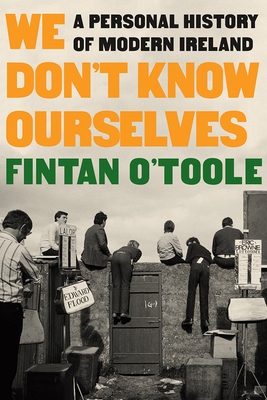 We Don't Know Ourselves: A Personal History of Modern Ireland by Fintan O'Toole
We Don't Know Ourselves: A Personal History of Modern Ireland by Fintan O'Toole Published by Liveright on March 15, 2022
Genres: History, Memoir, Nonfiction
Pages: 624
Format: E-Book, eBook
Buy on Amazon, Buy on Bookshop
This post contains affiliate links you can use to purchase the book. If you buy the book using that link, I will receive a small commission from the sale.
Goodreads
A quarter-century after Frank McCourt’s extraordinary bestseller, Angela’s Ashes, Fintan O’Toole, one of the Anglophone world’s most consummate stylists, continues the narrative of modern Ireland into our own time. O’Toole was born in the year the revolution began. It was 1958, and the Irish government—in despair, because all the young people were leaving—opened the country to foreign investment. So began a decades-long, ongoing experiment with Irish national identity. Weaving his own experiences into this account of Irish social, cultural, and economic change, O’Toole shows how Ireland, in just one lifetime, has gone from a Catholic “backwater” to an almost totally open society. A sympathetic-yet-exacting observer, O’Toole shrewdly weighs more than sixty years of globalization, delving into the violence of the Troubles and depicting, in biting detail, the astonishing collapse of the once-supreme Irish Catholic Church. The result is a stunning work of memoir and national history that reveals how the two modes are inextricable for all of us.
I thoroughly enjoyed this book and learned a great deal. As O’Toole argues in the Acknowledgments (and also in speaking engagements), his “life is too boring for a memoir and there is no shortage of modern Irish history” (587). So he combined the two and described the changes Ireland has undergone while sharing his personal stories and anecdotes as well as connections to and recollections of those events. The result is a thoroughly engaging read.
I appreciated O’Toole’s facility with a turn of phrase as much as his skill with organizing his ideas. I was glad I read the book on Kindle, as it’s a hefty tome at more than 600 pages, but I also felt freer to highlight and otherwise markup the text. O’Toole’s central argument is that Ireland has attempted to operate under a “doubleness… [a] permanent state of contradiction” (33) that O’Toole describes throughout the book as “a society that had developed an extraordinary capacity for cognitive disjunction, a genius for knowing and not knowing at the same time” (168). This capacity, O’Toole argues, prevented Ireland from progressing socially until the 1990s and from progressing economically until roughly the same time. The abuses of the Irish Catholic Church came to light in the 1990s, and O’Toole sees this as no coincidence. As I read, I kept thinking of how Sinéad O’Connor tried to cast light on these abuses and was ostracized and criticized for telling the truth. Ireland’s capacity to both know abuses were happening and pretend they were not resulted in mass emigration and trauma, but O’Toole believes Ireland may have “reached the point of accepting that half-knowledge—the ability to see clearly what is, while also acknowledging what is dark—is better than the swinging between the pretence of knowing everything and the denial of what you really do know” (569).
O’Toole thoroughly covers many major events in Irish history over the last 60 or so years, and I was especially interested in reading about the Troubles. One of my earliest memories of a news story that captured my attention was the hunger strikes in the early 1980s. I just couldn’t fathom how someone might stop eating to protest. I had a very simplistic understanding of the Troubles until recently. O’Toole argues that at least in part, admiration for martyrdom prolonged the Troubles. O’Toole explains that the hunger strikes were a part of this mindset: “We sacrifice ourselves. By doing so we show that life itself—including your life—is not the ultimate value” (325). Thatcher’s Britain doesn’t get a pass. O’Toole criticizes the UK’s lack of understanding and treatment of the prisoners during the hunger strike. O’Toole says if the British government had allowed the IRA prisoners to wear their own clothes “a year earlier, dozens of people, inside and outside the prison, would not have died” (335).
I first heard about this book from a book review by Cullen Murphy in The Atlantic. The review intrigued me, so I purchased the book for my Kindle. I had a feeling I’d want to own this one and mark it up well. I have been on spring break for the last two weeks, and I wanted to go into Boston and get a library card from the Boston Public Library, so I visited their website to find out the requirements. The website advertised that Fintan O’Toole would be giving a talk about his new book at the library on Friday, March 18. It seemed like kismet. My son and I rode the train into Boston and enjoyed a great day wandering around the city, culminating our visit with a library visit to hear O’Toole speak. I was fascinated to hear him discuss his frustration with Brexit. He said that no consideration had been given to Northern Ireland in Brexit at all, but as he explained it, citizens of Northern Ireland are free to define themselves as Irish, English, or both. I didn’t know that. I also didn’t know that they can rejoin the Republic of Ireland any time a majority of the citizens of Northern Ireland decide they want to. I think it will be very interesting to watch how Ireland’s future unfolds, especially now that Brexit means the border between Ireland and Northern Ireland is an EU border as well.